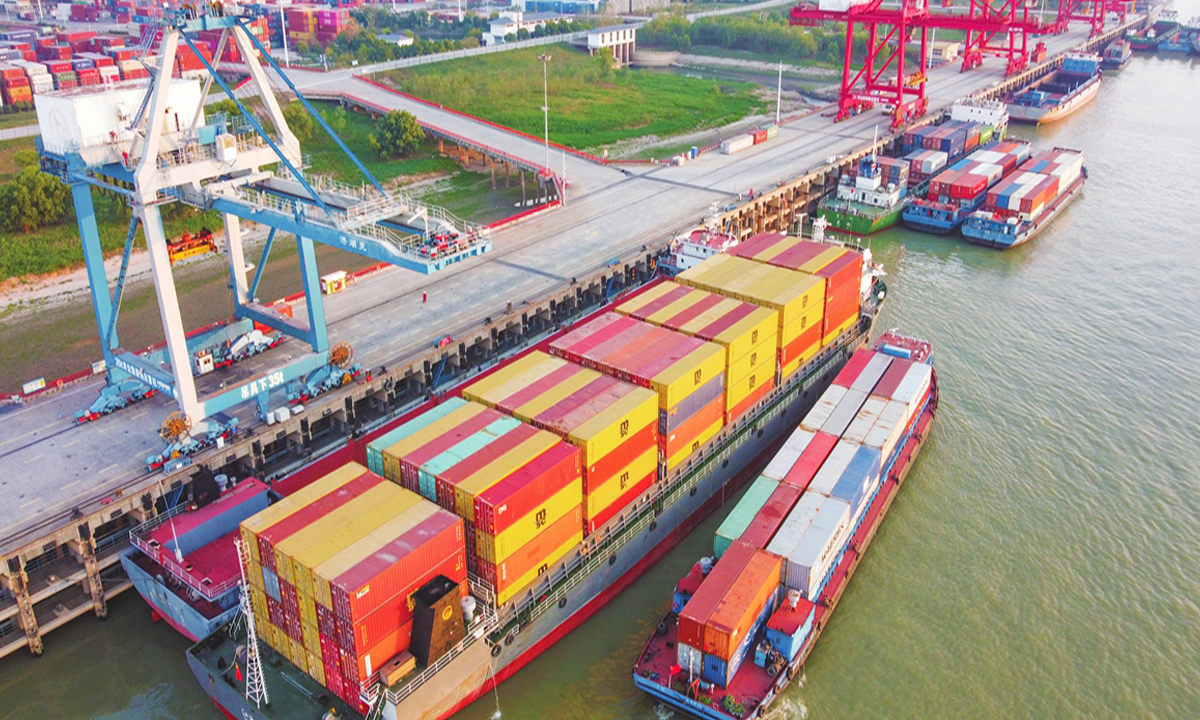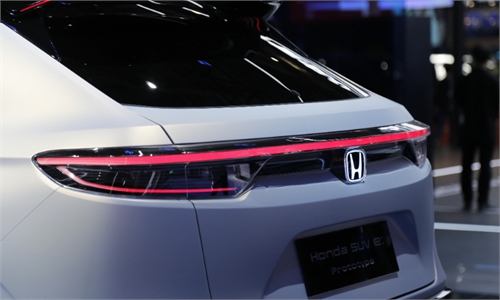China, S.Korea pursue broader cooperation, technologies, renewable energy highlighted

Cargo ships load at Wuhu Port in East China's Anhui Province on November 5, 2022. Bulk cargo throughput reached 17.34 million tons in the first nine months this year, up 18 percent year-on-year, while container shipment rose 14.6 percent to hit 935,300 containers in the first three quarters. Photo: cnsphoto
China and South Korea recently held a series of economic and trade events recently, from official meetings and investment fairs to people-to-people dialogues. Experts said that the exchanges are necessary and timely amid a gloomy and more uncertain global economic outlook, and will contribute to in-depth cooperation between the two countries and help industrial supply chains stability.
The Korea Trade-Investment Promotion Agency (KOTRA), a trade facilitation body funded by the South Korean government, is holding an export fair called "Boom up KOREA in China, Beijing" from Monday to Wednesday, the Yonhap News Agency reported.
It said that South Korean producers of materials, components and internet equipment as well as dozens of Chinese companies would attend the event, and the two sides will sign a Memorandum of Understanding worth $1.5 million.
This is one of the latest examples of the trade and investment fairs held between the two countries. On November 18, the 4th China-Korea Trade and Investment Expo and Jiangsu-Korea Economic and Trade Cooperation Exchange was held in Yancheng, East China's Jiangsu Province. A total of 21 projects were signed at the event, with a total investment of 47.3 billion yuan ($6.57 billion), according to the organizing committee of the China-Korea Trade and Investment Expo.
An economic and commercial cooperation exchange between East China's Shandong Province and South Korea was held on November 9, focused on logistics and the green economy to promote bilateral cooperation to a new stage.
In addition, the 14th China-South Korea Media High-level Dialogue was held simultaneously in Beijing and Seoul last week, attracting representatives from nearly 30 media organizations from both countries.
Those exchanges come at a critical time, reflecting that the two sides give high importance to bilateral economic cooperation and remain committed to maintaining sound cooperation momentum, Zhang Huizhi, vice dean of the Northeast Asian Studies College at Jilin University, told the Global Times on Monday.
"This is also a modification of South Korea's previous foreign policy that seemed to be veering away from China in terms of economic integration," Zhang said, noting that South Korea needs to re-attach importance to cooperation with China, a major source of its trade surplus, as it faces a sluggish economic recovery.
On Thursday, China's Assistant Commerce Minister Li Fei and South Korean economic affairs official Yun Seong-deok co-hosted the 26th Meeting of the China-South Korea Joint Economic and Trade Committee in a virtual format. The two sides reached broad consensus on securing supply chain stability, expanding trade and investment cooperation, and deepening provincial, regional and multilateral cooperation, the Chinese Ministry of Commerce said in a statement.
China has been the largest trade partner of South Korea for 18 consecutive years, with bilateral trade maintaining strong momentum this year despite global challenges. In the first seven months of 2022, bilateral trade reached $214.9 billion, up 8.9 percent year-on-year. South Korea's direct investment to China soared 44.5 percent year-on-year between January and July, official data showed.
According to a study by a South Korean institution, the correlation between the economies of the two countries since 2008 was 0.56, while that of South Korea and the US was 0.054 for the same period.
As the Regional Comprehensive Economic Partnership has entered into force in China, South Korea and other members, bilateral economic and trade cooperation will enjoy greater space for development, according to experts.
Along with a new round of technological and industrial reform as well as the rapid development of the green economy, there is growing potential for the two countries to carry out cooperation in many emerging sectors, Zhao Ping, vice-president of the Academy of the China Council for the Promotion of International Trade, said at the 14th China-South Korea Media High-level Dialogue.
She said that the two countries could expand cooperation in a vast range of sectors including high-tech manufacturing, renewable energy and artificial intelligence.
South Korea's Hyundai Motor Group started the construction of its first overseas fuel cell facility in Guangzhou, South China's Guangdong Province in March 2021, with the total investment estimated to reach 8.5 billion yuan by the end of 2030, the Xinhua News Agency reported.
Experts expressed optimism for China-South Korea cooperation. "South Korea has increasingly recognized that it couldn't improve its people's livelihood and boost economic growth without economic cooperation with China. The win-win nature of bilateral cooperation will not change," Zhang said, noting that trade cooperation will continue to serve as the ballast for bilateral ties.


